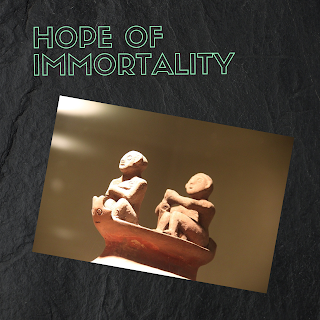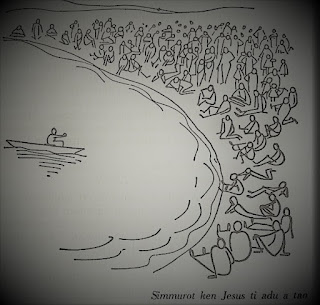The Hope of Immortality in the Book of Wisdom
 |
| Cover of the Philippine's Manuggul Jar representing the journey to the afterlife |
Today (10/16/2020), the SVD in the Philippines (Central Province) buried Fr. Leonardo N. Mercado, 85, SVD missionary and one of the pioneers of Filipino Philosophy (see his Elements of Filipino Philosophy, 1974).
The First Reading chosen for his funeral was from the Book of Wisdom (or Wisdom of Solomon). It speaks of the souls of the just, now in God's hand, and their hope is full immortality (3:1-9). [It is also the no. 1 among the selection of the first readings for the Commemoration of All Faithful Departed (All Souls' Day).
I thought it was a perfect choice for the funeral of a philosopher.
Short Background on the Book of Wisdom
Parts of the Book
- Part I: Book of Eschatology - Wisdom’s Gift of Immortality (1:1 – 6:21)
- Part II: Book of Wisdom - Power of Wisdom and Solomon’s Quest for Her (6:22 – 9:18)
- Part III: Book of History - Divine Wisdom in Exodus (10 – 19)
The Hope of Immortality
It is in Part I that The Sage focuses his rumination is on the destiny of the righteous and the wicked, a typical wisdom theme.
Immortality (ATHANASIA)
True to The Sage’s Jewish background in traditional wisdom, righteousness must be rewarded, and wickedness deserves punishment. The Sage, however, goes even further—a breakthrough so to speak—when his rumination leads him to posit “immortality” (ATHANASIA) as the reward of the righteous person after death.
The Sage teaches that the righteous even if they die, their hope of immortality is fulfilled (cf. 3:4b).
This new teaching has its roots in Greek philosophy (cf. immortality of the soul).
Unlike the Greeks, immortality is a divine gift or a gift of Wisdom (cf. 8:13) to the righteous and so is not inherent in the person. Immortality is not to be equated with an unending and linear physical existence. In contrast, it is “the state of blessed communion with God and with his saints” as one scholar writes.
Incorruption (APHTHARSIA)
Death for the righteous is a reality but temporary; it is but only a passageway to that kind of life with God.
Another term that the Sage uses for immortality is “incorruption” APHTHARSIA (cf. 2:23; 6:18-19).
Death for the wicked is permanent and it is the worst form of punishment as it is the total absence of God. “But by the envy of evil,” says the Sage, “death entered the world, and they who are allied with him experience it” (2:24).
The wicked, in contrast, says, “there is no remedy for dying” (2:1) and so “let us enjoy the good things that are here” (2:6). This hedonistic philosophy was from the Epicureans who also taught that the existence of God is absurd.
Angelic Food (AMBROSIA)
For the Greeks, immortality is for the gods who are sustained with special food (the AMBROSIA).
For the Sage, the divine food that sustains immortality is like the manna given by God to the Israelites in the desert. This “bread from heaven” (cf. Ps 105:40) is the “food for the angels” (cf. Ps 78:25, basis of the hymn Panis Angelicus).
The "icelike, quick-melting kind of ambrosial food" (cf. Wis 19:21) is unlimited, ready and pleasurable to eat, and having sweetness to every taste (cf. Wis 16:20, Omne delectamentum in se habentem, Response at the Benediction). This is the food that would take the righteous to immortality (cf. Wis 16:23).
--------
The essay is an excerpt from what I've written on the Book of Wisdom in The Books of the Bible: A Catholic Primer published by the Catholic Biblical Association of the Philippines, 2019.
I also wrote about this theme in Diwa: Studies in Philosophy and Theology with the title "A Note of Hope and Immortality in the Book of Wisdom". You can download a free copy (PDF) by clicking on the title.


Comments
Post a Comment